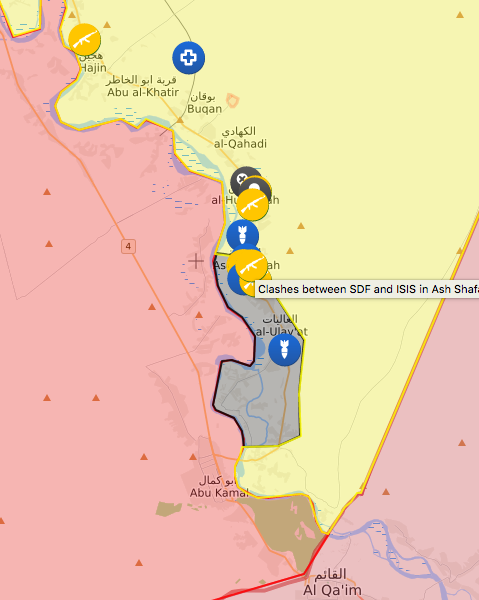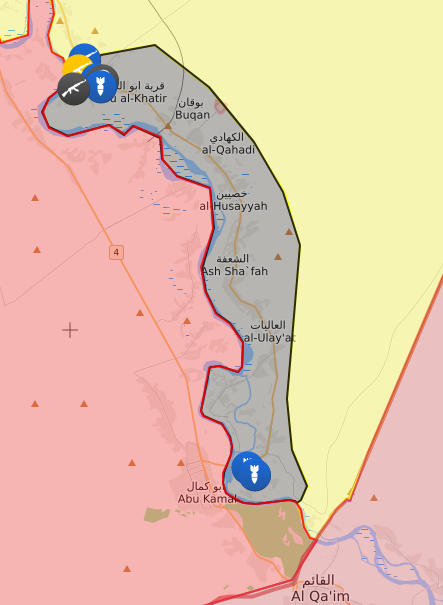Here’s an interesting look at Jihad in the Sahel, the transition zone between Saharan and Sub-Saharan Africa, originally from The Economist:
Nigerian troops huddle around their captain for a briefing. Several rest their rifle muzzles in the sandy ground, which could block and damage them. During the assault on a terrorist training camp, many forget their training, firing wildly and running off their line of advance. After capturing it, they mill about and ignore the booms of incoming artillery. Finally they are brought up short by an angry Scotsman, who shouts: “Ibrahim, you’re dead!”
This less-than-successful mock attack took place near the town of Bobo-Dioulasso, in the west of Burkina Faso. It was part of an American-led training exercise earlier this year involving some 2,000 elite troops from more than 30 countries. These two-week war games are the most visible part of a big Western push to turn the tide in a bloody, forgotten war. Jihadists are sweeping across the Sahel, an arid swathe of scrubland on the southern edge of the Sahara that stretches most of the way across Africa. They are also causing mayhem in Somalia. America, Britain, France and other Western powers are trying to help local forces in at least 16 countries beat them back. It is not going well.
Since the collapse of the “caliphate” in Syria and Iraq, Islamic State (is) has been looking for other places to raise its black flag. Africa, and especially the Sahel, is vulnerable. Governments are weak, unpopular and often have only a tenuous grip over remote parts of their territory. Abu Bakr al-Baghdadi, the leader of is, sees an opportunity. In a video released on April 29th, to prove that he is not dead (his first such appearance in five years), the bearded zealot waxed enthusiastic about Africa. “Your brothers in Burkina Faso and Mali…we congratulate them for their joining the convoy of the caliphate,” he said, according to the site Intelligence Group, which monitors jihadist communications.
Major General Mark Hicks, who commands America’s special forces in Africa (and was in Burkina Faso for the war games) fears that is is not the only terrorist group extending its franchise into his patch. “Al-Qaeda has taken a very serious long-term view of expanding here in the Sahel, and they’re seeing real success,” he says. His intelligence officers reckon that the groups they track contain about 10,500 jihadist fighters.
Most jihadists in Africa are fighting their own governments. But some attack Western targets. “If we don’t fight them here we will have to fight them on the streets of Madrid or Paris,” says a European intelligence officer.
One cannot generalise easily about African jihadist groups. Some are strictly local, having taken up arms to fight over farmland or against corrupt local government. Some adopt the “jihadist” label only because they happen to be Muslim. Many young men who join such groups do so because they have been robbed by officials or beaten up by police, or seen their friends humiliated in this way.
Other groups, such as al-Shabab in Somalia, are steeped in the teachings of al-Qaeda, the group behind the attacks on America on September 11th 2001. They tend to focus on spectacular atrocities, such as a truck bomb in 2017 in the Somali capital, Mogadishu, that killed almost 600 people. The most worrying groups are adherents of is that seek to hold territory. An offshoot of Boko Haram, for example, is building a proto-caliphate in northern Nigeria.
Don’t forget that Boko Haram pledged allegiance to the Islamic State in 2015, but has since splintered at least once.
Jihadist groups of all varieties are expanding their reach in the Sahel and around Lake Chad. Last year conflicts with jihadists in Africa claimed more than 9,300 lives, mostly civilian. This is almost as many as were killed in conflict with jihadists in Syria and Iraq combined. About two-fifths of those deaths were in Somalia, where al-Shabab frequently detonates car bombs in crowded streets. Many of the rest were in Nigeria, where the schoolgirl-kidnappers of Boko Haram and its odious offshoot, Islamic State West Africa Province, shoot villagers and behead nurses.
However, the area that aid workers and Western spooks worry about most is the Sahel. In Niger, Mali and Burkina Faso the number of people killed in jihad-related violence has doubled for each of the past two years, to more than 1,100 in 2018. And the violence is spreading, spilling across borders and threatening to tear apart poor, fragile states with bad rulers and swelling populations.
Snip.
Fear of refugees is one of the main reasons why European military powers are trying to stabilise the region. France has 4,500 troops fighting jihadists there. Germany and Italy each have about 1,000 soldiers in Africa. Britain has set up two specialised infantry units dedicated to training African soldiers in Nigeria and Somalia. America, which is more concerned about terrorism than refugee flows in this part of the world, has more than 7,000 military personnel in Africa.
The majority of Western troops do not fight jihadists directly—except in Somalia, where drone-fired missiles have killed many of al-Shabab’s fighters. Most are training local forces. They often have to start with the basics. In Nigeria, for instance, jihadists often sneak up and overrun army bases because the bush around them has not been cleared. Or they start shooting at them with a small force to goad the defenders into using up their ammunition firing back, leaving them helpless when the main attack begins.
Efforts to contain the spread of jihadism by training local armies or killing insurgent leaders are not obviously working. Take Mali, where in 2012 Tuareg separatists and jihadists allied to al-Qaeda swept out of the desert and conquered the north of the country using weapons looted from the arsenals of Libya’s dead dictator, Muammar Qaddafi. The rebels seemed ready to march on the capital, Bamako, and the south, which contains 90% of the population and sustains most of the economy.
French troops pushed them back from the main cities. But not even their expertise and firepower could defeat the rebels, who simply melted back into the desert. There they have survived a seven-year-long counterinsurgency campaign. Pundits in Paris are calling Mali “France’s Afghanistan”. And with good reason. The UN now has more than 16,000 peacekeepers in Mali, of whom 195 have been killed, making it the blue helmets’ most dangerous mission since its start in 2013. Nonetheless, the jihadists have continued to spread south into Niger and Burkina Faso.
The French are doing a lot of heavy lifting in Africa as part of Operation Barkhane, operating out of Chad and focused on five Ex-French colonies in Africa: Burkina Faso, Chad, Mali, Mauritania and Niger. (As colonial rulers, the French were worse than the British, but much better than the Belgians.) Four hostages were rescued from Jihadists in Burkina Faso in a raid that resulted in two dead French Special Forces troops, Cédric de Pierrepont and Alain Bertoncello. The hostages were originally seized in Benin, which is in political turmoil following a rigged election. (Hat tip: Charlie Martin.)
But U.S. forces are actively engaged across Africa, mostly in the Sahel and mostly in support missions, with at least 36 different code-named U.S. operations in Africa:
Between 2013 and 2017, U.S. special operations forces saw combat in at least 13 African countries, according to retired Army Brig. Gen. Don Bolduc, who served at U.S. Africa Command from 2013 to 2015 and then headed Special Operations Command Africa until 2017. Those countries, according to Bolduc, are Burkina Faso, Cameroon, Central African Republic, Chad, Democratic Republic of Congo, Kenya, Libya, Mali, Mauritania, Niger, Somalia, South Sudan and Tunisia. He added that U.S. troops have been killed or wounded in action in at least six of them: Kenya, Libya, Niger, Somalia, South Sudan and Tunisia….
The code-named operations cover a variety of different military missions, ranging from psychological operations to counterterrorism. Eight of the named activities, including Obsidian Nomad, are so-called 127e programs, named for the budgetary authority that allows U.S. special operations forces to use certain host-nation military units as surrogates in counterterrorism missions.
Used extensively across Africa, 127e programs can be run either by Joint Special Operations Command (JSOC), the secretive organization that controls the Navy’s SEAL Team 6, the Army’s Delta Force and other special mission units, or by “theater special operations forces.” These programs are “specifically designed for us to work with our host nation partners to develop small — anywhere between 80 and 120 personnel— counterterrorism forces that we’re partnered with,” said Bolduc. “They are specially selected partner-nation forces that go through extensive training, with the same equipment we have, to specifically go after counterterrorism targets, especially high-value targets.”
Some of the more important include Juniper Micron (logistics support of French forces), Juniper Nimbus (supporting the Nigerian military against Boko Haram), and Juniper Shield, the umbrella operation for counterterrorism efforts in northwest Africa, aimed at Boko Haram, the Islamic State in West Africa, and al Qaeda.
See also: Islamic State Affiliated Groups And Their Current Status.

